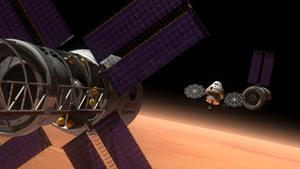
With just one space shuttle mission still on the docket, the current U.S. space program is quickly coming to an end, and soon the venerable workhorse shuttle will be put in mothballs and sent to museums. Until today, it was unclear as to where NASA would go with its next generation space vehicle, but earlier they announced a new system that will carry astronauts back into orbit, and beyond.
The new craft is dubbed the Multi-Purpose Crew Vehicle (MPCV) and it springs from a design that originated at Lockheed Martin. That aerospace company created the Orion Crew Exploration Vehicle, which puts a small capsule, not unlike the Apollo spacecraft that pre-date the shuttle, inside a multifunctional system that is built to put man in space in a far safer, and cheaper, manner than we currently are capable of.
The MPCV offers room for four crew members, down from the eight that were possible on the shuttle. It also lacks the shuttle's giant cargo bay, which means satellites and sections of the International Space Station will have to be delivered by other means. The crew can live aboard the MPCV for up to 21 days, inside its 316 cubic-foot cabin. There is room aboard for small projects and experiments, but otherwise, it'll be a rather cramped living quarters.
The new system is lauded for the fact that it suppose to be ten times safer than the current shuttle launch vehicle, which seems likely considering the issues that NASA has had in that regard. It also expected to be far less expensive to operate as well. But what has most space enthusiasts excited is that the MPCV can leave low orbit, something the shuttle wasn't capable of, and climb further out into the reaches of space, perhaps even to the moon at some point.
To read more about NASA's new project, click here.

